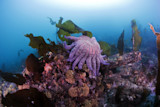Now Reading: Cholera-Linked Bacterium Fuels Sea Star Marine Epidemic
-
01
Cholera-Linked Bacterium Fuels Sea Star Marine Epidemic
Cholera-Linked Bacterium Fuels Sea Star Marine Epidemic

Quick Summary
- Marine Epidemic: Over 20 species of sea stars,including sunflower sea stars,have been impacted by a marine epidemic spanning from Alaska to Mexico for the past decade. Scientists recently identified the strain responsible.
- Culprit Identified: Researchers found that Vibrio pectenicida, a strain from the bacterial genus Vibrio (linked to cholera), is causing sea star wasting disease (SSWD).It damages tissues over two weeks,leading to death.
- Environmental Impact: The decline of sunflower sea stars-critically important for kelp forest ecosystems-has resulted in ecological imbalances with increased sea urchin populations and loss of kelp forests.
- Research Process: A microbial analysis conducted over four years confirmed V.pectenicida as the cause. Rising ocean temperatures may exacerbate its spread due to favorable conditions for bacteria reproduction.
- Recovery Efforts: Ongoing studies aim at genetic disease resistance, captive breeding, and reintroducing sunflower sea stars into wild habitats.
Read More: Discovermagazine.com
Indian Opinion Analysis
The identification of Vibrio pectenicida as the pathogen behind SSWD marks meaningful progress in marine science and ecology. For India-a nation with extensive coastal biodiversity-the study serves as an early warning regarding bacterial outbreaks perhaps linked to climate change-induced temperature rise in oceans. This insight reinforces India’s prioritization of sustainable ocean management practices under initiatives like “Blue Economy” and “coastal regulation Zone” norms.
Monitoring similar bacteria affecting coral reefs or other coastal ecosystems near Indian shores becomes critical since such disruptions can impact fisheries and livelihoods dependent on aquatic resources. Collaboration among global research networks could play an important role in containing such hazards while supporting conservation efforts vital not onyl for biodiversity but also regional economies.
Read More: Discovermagazine.com


























